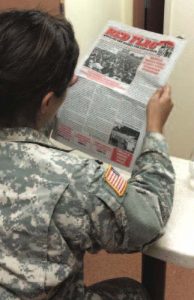Soldiers are Key to the Victory of Communist Revolution
Soldiers are not only up for grabs—they are crucial to the victory or defeat of a workers’ revolution. The situation in Bolivia is the latest example. As we go to press, dozens of units have deserted the Bolivian Army. These soldiers have refused to murder the masses in the street. While at least 30 people, mostly indigenous protestors, have been killed, video has surfaced of protestors calling on soldiers to join them. And some have.
This was also an inspiring aspect of the uprising in Ecuador. Soldiers united with workers, including indigenous protestors, against the police.
The current situation in Bolivia, Ecuador, and Venezuela shows us that the barracks are disputed spaces. Soldiers are politicized. They can refuse to attack their class and they are capable of defending causes they are convinced of. It is the responsibility of the party to win them to the cause of international communist revolution.
The coup against Evo Morales succeeded when the General Staff of the Bolivian army forced the president to resign his position. The position of the army has guaranteed, for the moment, the imposition of fascist reaction on the MAS Social Democratic project, marking a turning point in the days of violent protests after the presidential elections.
The betrayal by the military is a setback that Morales and his movement tried to avoid in their fourteen years of government. Like the Chavistas in Venezuela, under the MAS government, the military received government support to create their own companies. Officers and soldiers benefited from a series of salary and labor benefits, such as pensions equal to 100% of their salaries as active military (El País, 12/10/2019).
In contrast, the Venezuelan military, unlike the Bolivians, has been the fundamental piece for Maduro to continue in power. Despite attempts by the US government to persuade the Venezuelan army to rebel against Chavismo, only a few insignificant units have changed sides.
The coup d’etat in Bolivia has revived hatred and fears of Latin American armies among leftists and liberals. They ask, as a maximum and radical proclamation, the elimination of all the armed forces in the continent as in Costa Rica. Instead of being a revolutionary demand, this is a bourgeois demand. The army is not the only repressive apparatus of the state. When the class struggle intensifies, the Bourgeois State is capable of turning its police forces into an occupying army, as it does in the black communities of the United States.
Other liberals and leftists defend the armies “loyal to the socialist cause.” They do not see that within these the hierarchy, professionalization and isolation of the masses continues. The experience of the Soviet Red Army and the People’s Liberation Army in China have taught us that by leaving intact bourgeois social relations within the army, it can become the armed force of the new capitalist ruling class.
What we propose is not loyalty to a socialist state which maintains wages, money and exploitation, albeit with some reforms. And we do not advocate bribing the military to win its support. We are fighting for communism. The loyalty of soldiers and all workers must be to the working masses, and to a society that produces for need, not for profit. In such a society, new communist social relations are our best strategy to protect the advances of the revolution.
Weapons are the guarantee. Our security and that of the revolution will depend on the social relations mediated by weapons. The masses organized by the Party must have control of the weapons and make the fundamental decisions at a tactical and strategic level. But the main question will be the political commitment of the armed masses to communism.

Read our pamphlet:
Soldiers, Sailors and Marines:
Crucial to a Communist Workers’ Revolution icwpredflag.org/mpe.pdf


